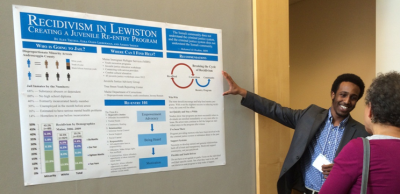Community-Engaged Research

Ahmed Sheikh ’17, discusses research on re-entry programs for juveniles in the Maine correctional system, conducted to support an initiative by Maine Immigrant and Refugee Services (MIRS).
Community-engaged research (also known as community-based research) is an important strand of academic civic engagement supported by the Harward Center. Students in diverse departments and programs undertake community-engaged research in courses and for their senior thesis or capstone project. Some departments offer research methods courses that focus specifically on collaborating with the community for research. Harward Center staff offer support for students performing community-engaged research through one-on-one consultations as well as the Community-Engaged Research (CER) Fellows Program.
COMMUNITY-ENGAGED THESIS PROJECTS AND INDEPENDENT STUDIES
Many opportunities for community engagement are available for students who are completing an honors thesis, thesis, or independent study. Community partners often approach us with research questions that do not fit easily within the context of a twelve-week course. The sustained attention and detailed analysis that an individual student can provide through a focused semester or year-long project can have a significant and long-lasting impact, and students also benefit significantly from these collaborations. Among recent Bates alumni who were surveyed about their work with the Harward Center in May of 2016, an overwhelming majority of those who conducted their thesis research in the community said that this work influenced their career trajectory and deepened their commitment to civic engagement.
The process for initiating a community-engaged research project can unfold in a number of ways. Sometimes a student might develop a thesis research question through prior work done with a community agency. In other cases, the student’s research might tie in with questions a faculty member is exploring in the community. If you are considering a community-engaged research project or studying a topic related to current issues within Lewiston-Auburn, we encourage you to contact Harward Center staff and consider whether there are local organizations that could benefit from collaborating with you. We can also help you to determine whether you need Institutional Review Board (IRB) approval for your chosen topic.
Examples of Community-Engaged Honors Theses from 2022 include:
- Lauren Berube (Mathematics), “Adaptability: A community engaged thesis aimed to improve mathematics engagement and motivation at Lewiston Middle School”
- Mary Corcoran (Sociology), “Antiracist Restorative Practice Implementation at Lewiston Middle School: A Community Engaged Research Study”
- Tess Hick (Mathematics), “Math for Liberation: Exploring the Mathematics of Voting Systems with Lewiston Middle School”
- Hart Rorick (Environmental Studies) “Exploring Urban Climate Resilience: Constructing an Equity Atlas for Climate Change Vulnerabilities in South Portland, Maine”
- Paige Sonoda (Psychology, Sociology) “Liberatory Digital Storytelling: Sharing Stories of Multiracial Asian Americans”
You can find information on other community-engaged research projects from this year and previous years on the SCARAB catalog, and in our annual reports.
COMMUNITY-ENGAGED RESEARCH FELLOWSHIPS
CER Fellowships provide funding, mentoring, and peer reflection for student projects that engage public needs, as articulated in dialogue with community partners, through significant academic research. CER Fellows receive a stipend of $400 for the Winter semester. Equally important, they join a community of support by participating in a non-credit Fellows’ Seminar, led by Darby Ray, Harward Center Director and Professor of Civic Engagement, and Morgan Kinney, Associate Director of Community-Engaged Learning and Research. The bi-weekly seminar (ungraded) will expose students to the history, methods, and ethics of community-engaged research across different disciplines, engage them in thinking about the distinctive values and challenges of community-engaged research, and offer them an interdisciplinary peer community for trouble-shooting and sharing their work. The Seminar, which usually takes place at the Harward Center over a home-cooked meal or a meal from local restaurants, will begin meeting in January and continue, roughly on a biweekly basis, throughout Winter term, meeting 6-7 times and culminating with a session at the Mount David Summit. The meeting dates and time will be selected in consultation with selected participants.
Please contact Darby Ray or Morgan Kinney with questions about the Community-Engaged Research Fellows Program or for advice about specific project proposals.